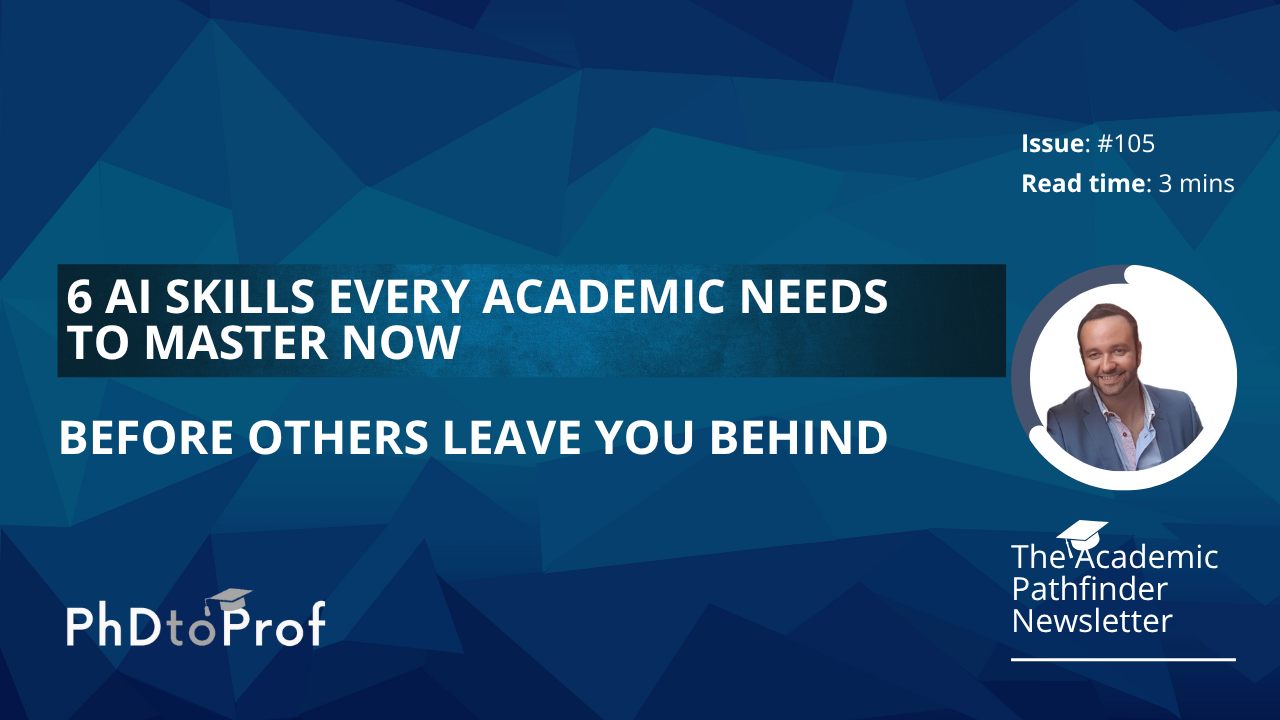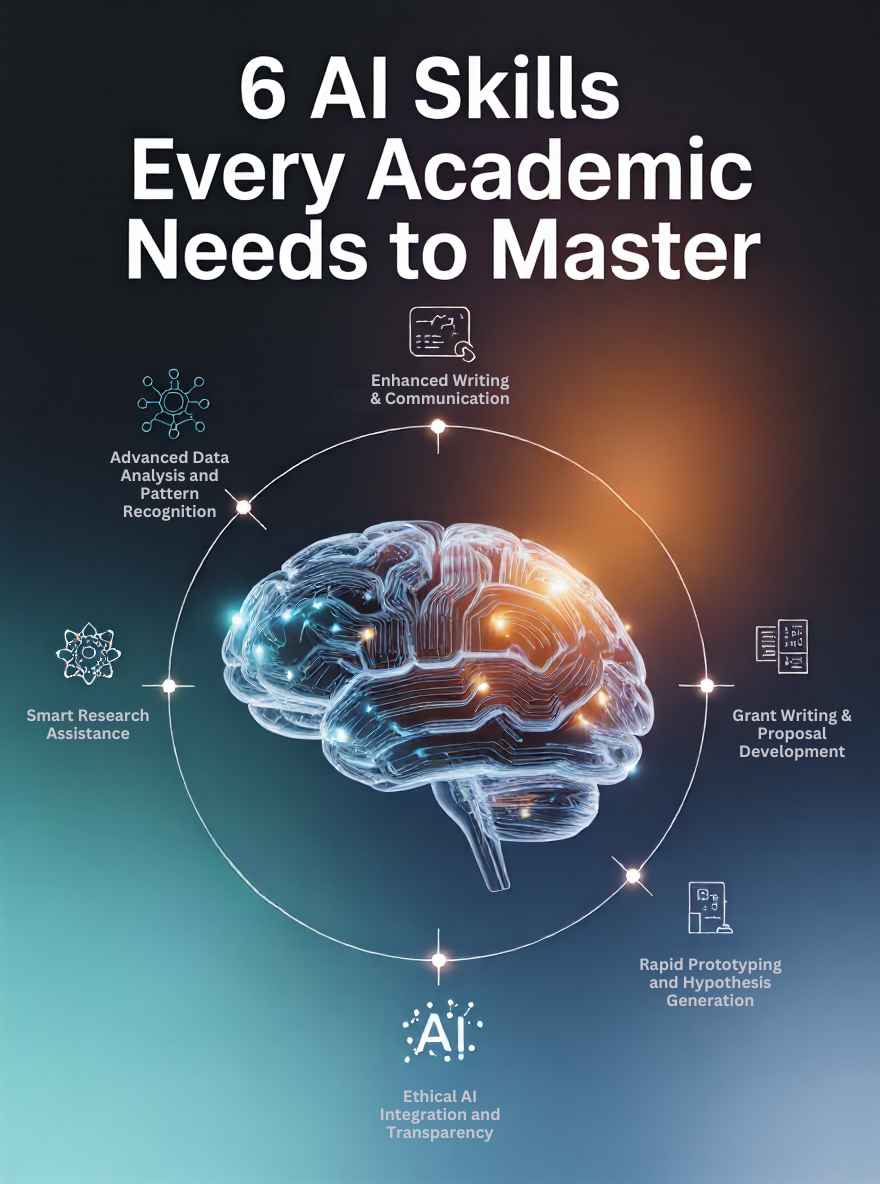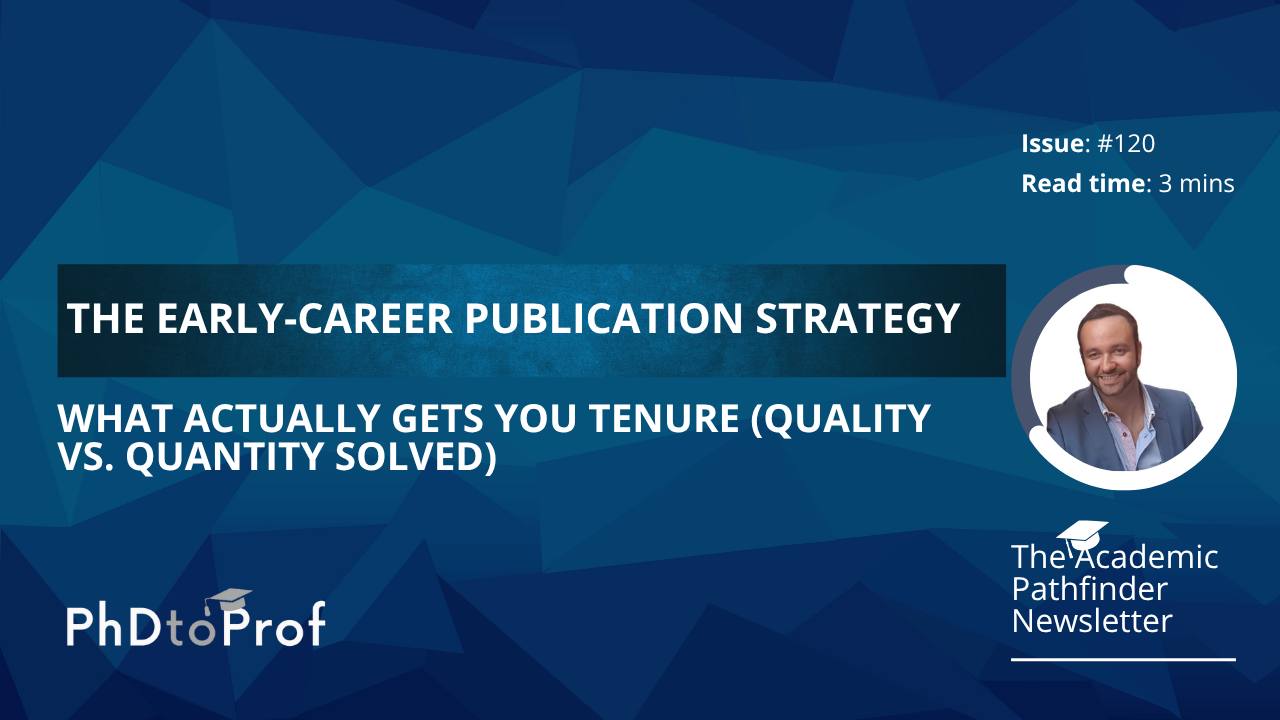#105 - 6 AI Skills Every Academic Needs to Master Now (Before Others Leave You Behind)

Today, I'm sharing the six essential AI skills that every researcher needs to develop to stay competitive and relevant in the rapidly evolving academic landscape.
9 July 2025
Read time: 3 minutes
Supporting our sponsors directly helps us continue delivering valuable content for FREE to you each week — your clicks make a difference!
Get My FREE Academic Job Startup Guide
Get my 18-page guide, absolutely FREE, that teaches you the STEPS Framework - the systematic 5-step application process that transforms your academic job search from random applications with 2-3% success rates to strategic targeting with 15-20% success rates - completely FREE for a limited time only.
The academic world is changing fast.
While some researchers resist new technology, others are using AI tools to
- publish more papers,
- write better grants,
- and make breakthrough discoveries faster than ever before.
The academics who learn to work with AI now will have huge advantages in the next five years, while those who ignore it will struggle to keep up.
Today, I'm sharing the six essential AI skills that every researcher needs to develop to stay competitive and relevant in the rapidly evolving academic landscape.

Two years ago, I was skeptical about AI in research.
I thought it would never replace human expertise and creativity.
But after watching AI-savvy colleagues dramatically increase their productivity while maintaining quality, I decided to systematically learn these tools.
The results amazed me.
My literature reviews became faster and more comprehensive.
My data analysis caught patterns I would have missed.
Most importantly, I had more time for deep thinking because AI handled the routine tasks that used to consume my days.
Skill #1: Smart Research Assistance
AI can help you find relevant papers, identify research gaps, and organize complex information faster than traditional methods.
How to develop it: Start using AI tools to help with literature searches and paper summaries.
Learn to write effective prompts that get you useful results.
Practice having AI help you identify connections between different research areas that you might not see on your own.
The key is learning to guide AI effectively while still applying your own critical thinking to evaluate what it finds.
Skill #2: Enhanced Writing and Communication
AI can help you write clearer sentences, structure arguments better, and adapt your writing for different audiences without losing your unique voice.
How to develop it: Use AI to help brainstorm ideas, improve sentence flow, and check for clarity.
Practice using it to translate complex concepts into simpler language for broader and layman audiences.
Learn how to maintain your authentic voice while benefiting from AI's suggestions.
Remember that AI should enhance your writing, not replace your ideas and insights.
Skill #3: Advanced Data Analysis and Pattern Recognition
AI can spot patterns in large datasets that humans might miss and suggest new analytical approaches you hadn't considered.
How to develop it: Learn basic AI analysis tools that work with your research data.
Practice using AI to generate visualizations and identify unexpected correlations.
Develop skills in prompting AI to explain statistical results in clear language.
Always verify AI analysis with your own expertise and traditional statistical methods.
Skill #4: Rapid Prototyping and Hypothesis Generation
AI can help you quickly test ideas, generate multiple research approaches, and explore "what if" scenarios before investing significant time and resources.
How to develop it: Use AI to brainstorm research questions, design preliminary studies, and explore different methodological approaches.
Learn to use it for creating quick prototypes of surveys, interview guides, or experimental designs.
Focus on using AI to expand your creative thinking, not limit it to conventional approaches.
Skill #5: Grant Writing and Proposal Development
AI can help you craft compelling narratives, identify relevant funding opportunities, and strengthen your proposal arguments.
How to develop it: Practice using AI to help structure grant proposals, improve clarity of research descriptions, and identify potential weaknesses in your arguments.
Learn to use it for researching funding agency priorities and tailoring proposals accordingly.
Your expertise and original ideas must drive the proposal, with AI providing writing and organizational support.
Skill #6: Ethical AI Integration and Transparency
The most important skill is knowing how to use AI responsibly while maintaining research integrity and meeting disclosure requirements.
How to develop it: Learn current ethical guidelines for AI use in your field.
Practice documenting your AI use clearly and transparently.
Develop judgment about when AI use is appropriate and when it's not.
Stay updated on changing policies from journals, funding agencies, and your institution.

Key Takeaways:
- Start with research assistance and writing support to build comfort with AI tools before moving to advanced applications
- Always verify AI output with your expertise - AI should enhance your capabilities, not replace your critical thinking
- Develop ethical AI practices from the beginning - transparency and responsible use will protect your reputation
-
→ Your Action Plan for This Week
- Choose one AI tool to try for literature search or writing assistance
- Practice writing clear prompts that get useful AI responses for your research area
- Research the current AI policies at your institution and target journals
Well, that’s it for today.
See you next week.
Whenever you're ready, there are 3 ways I can help you:
1. Get free actionable tips on how to secure a tenure-track job in academia by following me on X, LinkedIn me Instagram and BlueSky
2. Take my proven Academic Job Accelerator Program that has helped hundreds of researchers secure academic positions.
3. If you're ready to take your PhD application journey to the next level, join my PhD Application and Scholarship Masterclass waitlist. Click the link below to learn more and secure your spot.



Responses